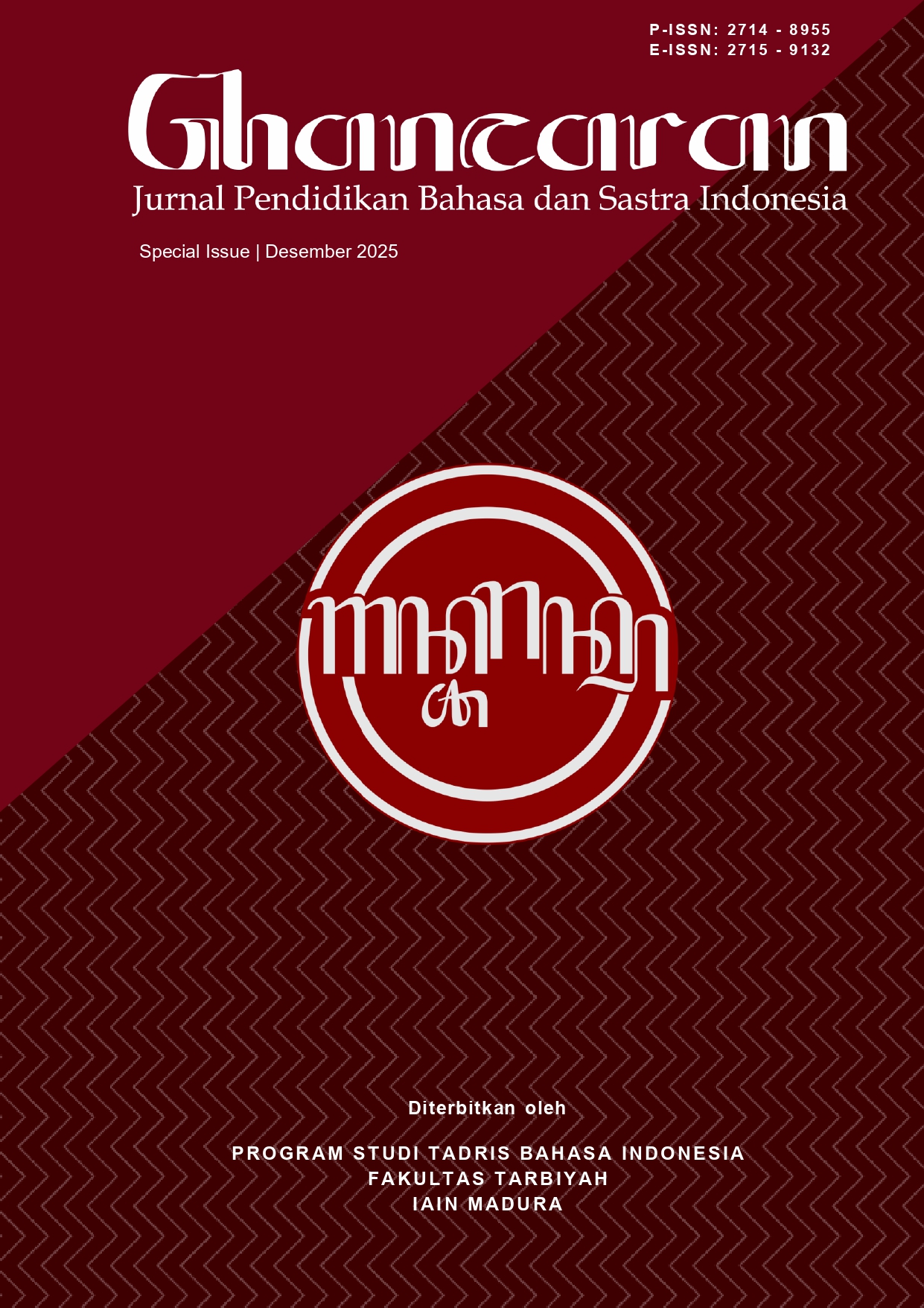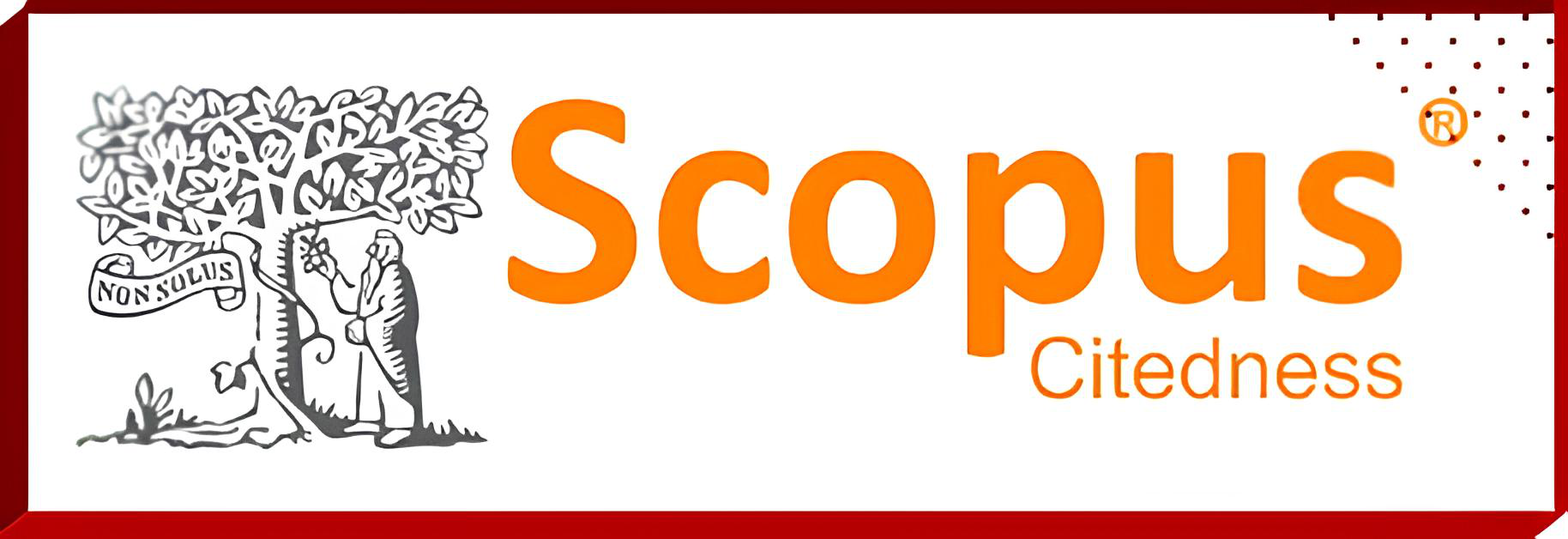Interpretasi Hermeneutik Karakter Kewirausahaan dalam Novel: Kontribusi Interdisipliner bagi Perkembangan Studi Sastra dan Kewirausahaan di Masa Depan
 Abstract views: 401
,
Abstract views: 401
,
 PDF downloads: 457
PDF downloads: 457
Abstract
This study aims to interpret entrepreneurial characters in novels as cultural constructs embedded with values and ideology. Through a hermeneutical approach, literary works are understood as social discourses that reflect societal value systems, rather than merely aesthetic products. The study responds to the limitations of normative approaches in entrepreneurship education, which often emphasize practice and outcomes, by highlighting the importance of symbolic and narrative dimensions in literary texts. A qualitative method employing hermeneutic text analysis was applied to two novels by Asma Nadia: Bidadari untuk Dewa and Cinta Dua Kodi. Data were collected through close reading, literature review, interpretive validation, narrative excerpt classification, and categorization based on entrepreneurial character indicators. The findings reveal seven dominant entrepreneurial traits: responsibility, risk-taking, achievement motivation, self-confidence and optimism, collaboration, creativity and innovation, and leadership. Using the hermeneutic circle method, each trait was analyzed as a construction of meaning, emerging not only from narrative progression but also from the symbolic interaction between text and reader. These narratives show that entrepreneurial characters in the novels are shaped by the tension between personal idealism, religious values, and socio-economic dynamics. In-depth interpretation of dialogues, monologues, and dramatic situations enables a comprehensive reading of entrepreneurial actions as representations of cultural and spiritual identity. This research contributes to the interdisciplinary integration between literature and entrepreneurship studies by emphasizing the narrative dimension in shaping entrepreneurial character. The results demonstrate that literary texts can serve as reflective media in entrepreneurship education to foster ethical, resilient, and value-oriented entrepreneurial mindsets. The study recommends the strategic use of literature as a pedagogical tool to enrich value-based approaches in entrepreneurship development.
Downloads
References
Ahmed, A. E., Ucbasaran, D., Cacciotti, G., & Williams, T. A. (2022). Integrating Psychological Resilience, Stress, and Coping in Entreprene urship: A Critical Review and Research Agenda. Entrepreneurship Theory and Practice, 46(3), 497–538.
Aust, A. M., Aundrup, M., Greven, A., & Brettel, M. (2024). Exploring the relationship between hybrid founder social identities an d entrepreneurs’ psychological resilience. Journal of Small Business Management, 63(4), 1518–1551.
Azazz, A. M. S., & Elshaer, I. A. (2022). Amid COVID-19 Pandemic, Entrepreneurial Resilience and Creative Perfor mance with the Mediating Role of Institutional Orientation: A Quantita tive Investigation Using Structural Equation Modeling. Mathematics, 10(12), 2127.
Bleicher, J. (1980). Contemporary hermeneutics: Hermeneutics as method, philosophy and critique. Routledge & Kegan Paul.
Chang, Q. (2022). The contribution of a hermeneutic approach to investigate psychologica l variables in second language acquisition. Frontiers in Psychology, 13.
Class, M. (2023). Introducing Trace as an Embodied Approach to the Novel in English. English Studies, 104(4), 579–588.
Cope, J. (2021). Entrepreneurial learning from failure: An interpretative phenomenological analysis. Journal of Small Business Management, 59, 365–390.
Emden R. J.; Droge C., Z. ; C. (2006). Collaborating for new product development: Selecting the partner with maximum potential to create value. Journal of Product Innovation Management, 23(4), 330–341.
Erkurt, G. Ş. (2021). Hermeneutik ve Alımlama Estetiği Kuramlarının Yazınsal Metinlerin Karş ılaştırmalı Çözümlemelerine Etkisi. Turk Turizm Arastirmalari Dergisi, 4(5), 418–436.
Eva, N., Robin, M., Sendjaya, S., van Dierendonck, D., & Liden, R. C. (2019). Servant Leadership: A systematic review and call for future research. The Leadership Quarterly, 30(1), 111–132.
Fayolle, A. (2013). Personal views on the future of entrepreneurship education. Entrepreneurship & Regional Development, 25(7–8), 692–701.
Fazal, S., Raza, S. A., & Majid, A. (2022). Motivational factors and sustainability of micro-enterprises: Evidence from developing economies. Sustainability, 14(9), 11223.
Fellnhofer, K. (2021). Narratives and legitimacy in entrepreneurship: Exploring identity work and audience engagement. Journal of Business Research, 136, 620–630.
Ferreira, J. J., Fernandes, C. I., & Kraus, S. (2019). Entrepreneurship research: Mapping intellectual structures and research trends. Review of Managerial Science, 13, 181–205.
Gabidullina, F., Zhundibayeva, A., Makarova, V. F., Galiullin, R., & Mubarakshina, I. (2018). The Realization of the Hermeneutical Approach to the Text in Practical Classes in the Literature during the Work with Students of Philologic al Faculty.
Gadamer, H.-G. (2004). Truth and method (2nd ed.). Continuum.
Gimenez-Jimenez, D., Edelman, L. F., Dawson, A., & Calabrò, A. (2022). Women entrepreneurs’ progress in the venturing process: the impact of risk aversion and culture. Small Business Economics, 58(2), 1091–1111.
Green, K. R., & Wraight, T. (2025). Willy Wonka and the boy-entrepreneur archetype: the changing faces of entrepreneurial masculinity, 1971–2023. International Journal of Gender and Entrepreneurship.
Hartmann, S., Backmann, J., Newman, A., Brykman, K. M., & Pidduck, R. J. (2022). Psychological resilience of entrepreneurs: A review and agenda for fut ure research. Journal of Small Business Management, 60(5), 1041–1079.
Jurkiewicz, T. (2022). The Intersection of Hans-Georg Gadamer and Roman Ingarden in the Herme neutic Experience of Fictional Worlds. Journal of the British Society for Phenomenology, 54(2), 99–112.
Kalkman, J. P. (2024). Exploring the Human Condition: A Methodological Literature Review of F iction-Based Research. International Journal of Qualitative Methods, 23.
Ladkin, D., & Probert, J. (2021). From sovereign to subject: Applying Foucault’s conceptualization of power to leading and studying power within leadership. The Leadership Quarterly, 32(4), 101310.
Lagrasta, F. P., Scozzi, B., & Pontrandolfo, P. (2024). Feminisms and entrepreneurship: a systematic literature review investi gating a troubled connection. International Entrepreneurship and Management Journal, 20(4), 3081–3112.
Laine, L., & Kibler, E. (2020). The Social Imaginary of Emancipation in Entrepreneurship. Entrepreneurship Theory and Practice, 46(2), 393–420.
Loacker, B. (2021a). Entrepreneurship and the struggle over order and coherence: a thematic reading of Robert Musil’s The Man Without Qualities. Culture and Organization, 27(5), 403–422.
Loacker, B. (2021b). Entrepreneurship and the struggle over order and coherence: a thematic reading of Robert Musil’s The Man Without Qualities. Culture and Organization, 27(5), 403–422.
Lundqvist, M., Williams-Middleton, K., & Nowell, P. (2015). Entrepreneurial Identity and Role Expectations in Nascent Entrepreneurship. Industry and Higher Education, 29(5), 327–344.
Mahadee, I. S. (2020). Exploring entrepreneurial leadership in SMEs: Evidence from Malaysia. Journal of Small Business and Enterprise Development, 27(3), 349–367.
Meretoja, H. (2018). The narrative turn in fiction and theory: The ethics and politics of narrative. Narrative, 26(2), 139–147.
Miles, M. B., & Huberman, A. M. (1992). Qualitative data analysis: An expanded sourcebook (2nd ed.). Sage Publications.
Najafi-Tavani H.; Najafi-Tavani Z., S. ; S. (2018). Achieving agility through supplier flexibility and responsiveness. International Journal of Operations & Production Management, 38(3), 636–666.
Nguyen, J., Ferraro, C., & Sands, S. (2020). Similarity over difference: How congruency in customer characteristics drives service experiences. Journal of Business Research, 121, 592–603.
Oliva, F. L., Couto, M. H. G., Santos, R. F., & Bresciani, S. (2019). The integration between knowledge management and dynamic capabilities in agile organizations. Management Decision, 57(8), 1960–1979.
Perry, M. S. (2019). Literature for the Twenty-first Century: Developing Multimodality and Entrepreneurial Skills through Literature-Based Assessments. Kritika Kultura, 33/34.
Pounder, P. A. (2021). Social entrepreneurship and cultural contextualization: a review. International Journal of Development Issues, 20(3), 344–357.
Ramsgaard, M. B., & Blenker, P. (2021). Reinterpreting a signature pedagogy for entrepreneurship education. Journal of Small Business and Enterprise Development, 29(2), 182–202.
Reichert, P., Bird, M. D., & Farber, V. (2021). Gender and entrepreneurial propensity: risk-taking and prosocial preferences in labour market entry decisions. Social Enterprise Journal, 17(1), 111–139.
Roundy, P. T. (2020). On Entrepreneurial Stories: Tolkien’s Theory of Fantasy and the Bridge between Imagination and Innovation. Business Perspectives and Research, 9(1), 31–45.
Schaufele, M. (2019). Why Are We Reading This? Hermeneutic Inquiry into the Practice of Teac hing (with) Literature. Educational Studies, 56(2), 145–159.
Sharma, S., & Rautela, S. (2022). Entrepreneurial resilience and self-efficacy during global crisis: study of small businesses in a developing economy. Journal of Entrepreneurship in Emerging Economies, 14(6), 1369–1386.
Shcherbyna, S. (2018). Anglo-american schools of scientific communication in the context of academic discourse genres. Advanced Education, 5.0(0.0), 219–224.
Soumia Meziane; Nawal Mebitil. (2024). Narrative Identity Through A Ricoeurian Lens. Revue Des Arts, Linguistique, Littérature & Civilisations, 4.
Stephan, U. (2022). Cross-Cultural Innovation and Entrepreneurship. Annual Review of Organizational Psychology and Organizational Behavior, 9(1), 277–308.
Strandvad, S. M. (2023). From Gung Ho Heroes and Their Tragic Counterparts to Catalyst Characte rs. Artivate: A Journal of Entrepreneurship in the Arts, 11(2).
Thai, Q. H., & Mai, K. N. (2023). An evolution of entrepreneurial culture studies: A systematic literatu re review and future research agenda. Entrepreneurial Business and Economics Review, 11(2), 31–62.
Tsou J. S.; Liao W. H., H. T. ; C. (2015). Market and technology orientations for service innovation: Synergistic effects and innovation performance. International Journal of Service Industry Management, 26(1), 78–104.
Walonen, M. K. (2019). Debunking the Myth of the Entrepreneur through Narrative in the Contem porary South Asian Novel. Interventions, 22(2), 246–260.
Wei, J., Chen, Y., Zhang, Y., & Zhang, J. (2020). How Does Entrepreneurial Self-Efficacy Influence Innovation Behavior? Exploring the Mechanism of Job Satisfaction and Zhongyong Thinking. Frontiers in Psychology, 11.
Wiyono, B. B., & Wu, Y. (2022). Achievement motivation and entrepreneurial leadership among university students: A meta-analytic review. Administrative Sciences, 12(4), 164.
Xu, C., & Sun, Y. (2025). Voices in the wind: literary figures and institutional entrepreneurshi p. Management Decision.
Zhang, J., & Huang, J. (2021). Entrepreneurial Self-Efficacy Mediates the Impact of the Post-pandemic Entrepreneurship Environment on College Students’ Entrepreneurial Intention. Frontiers in Psychology, 12.
Copyright (c) 2025 GHANCARAN: Jurnal Pendidikan Bahasa dan Sastra Indonesia

This work is licensed under a Creative Commons Attribution-ShareAlike 4.0 International License.
Ghancaran: Jurnal Pendidikan Bahasa dan Sastra Indonesia uses an Open Access Policy under the Creative Commons Attribution-ShareAlike 4.0 International License. Authors publishing in this journal agree to the following terms:
- Ghancaran Journal holds the copyright and grants the journal rights for first publication with the work simultaneously licensed under a

The work is distributed under Creative Commons Attribution-ShareAlike 4.0 International License which allows others to share, copy, and redistribute the material in any media or format and adapt, remix, change, and develop the material even for commercial purposes, as long as it is stated credit and license derivative works under similar terms. - Authors may make additional contractual arrangements for non-exclusive distribution of the journal's published work version.
- Authors are permitted to post their work online (e.g., in institutional repositories or on their websites) before and during submission, as doing so may lead to productive exchange.



















